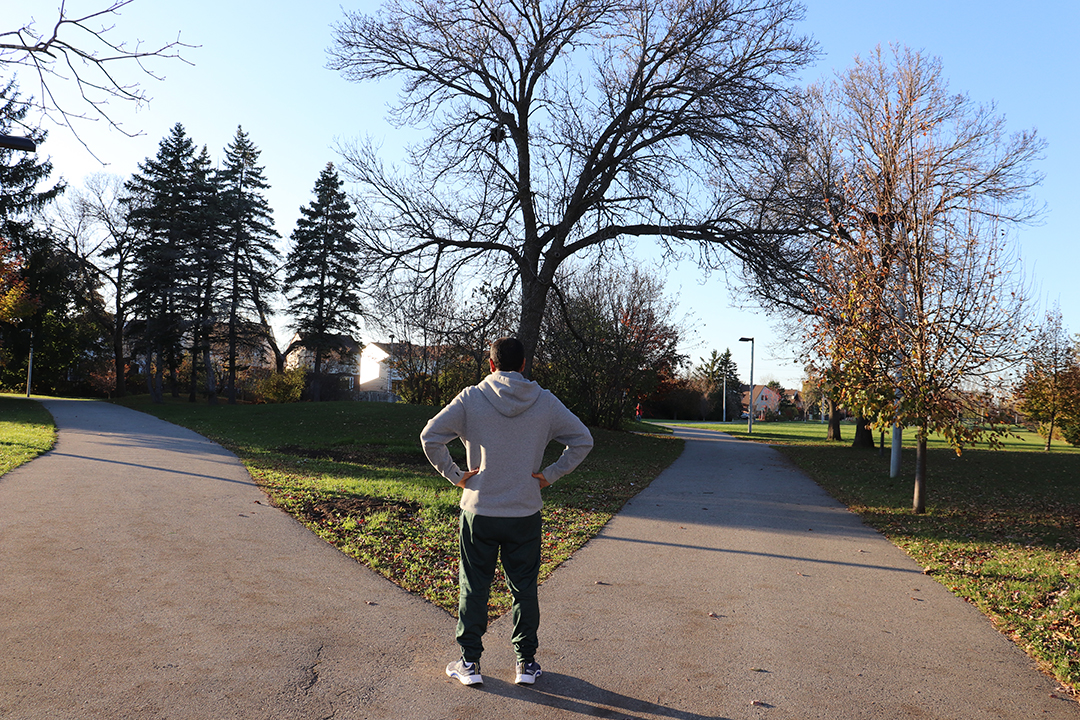I come from a family of mountaineers, and nothing excites me more than a rocky trail. I grew up in the Atlas Mountains in North Africa trying to walk its unpredictable paths and turns safely. Both on the mountain and in my day to day life, I was predisposed to face change.
In life, I’ve found walking a steady path is boring and pitiful. Throughout my career, I always went out of my comfort zone. I accepted a job offer as a student events coordinator from the first international American university. I moved from academia to an automobile company to be a corporate trainer.
I lived in small cities then moved to the noisiest city in Morocco, Casablanca. In Canada, I was a customer representative for Quickbooks Online, an accounting service provider. I was the first check-in point for the Canadian Architecture Certification Board.
Prince Harry in his book Spare compares succession to the throne to the weather, the position of planets or the turn of the seasons. He did not worry about unchangeable things.
“Being a Windsor and working out which truths were timeless and then banishing them from your mind,” says Prince Harry in his audiobook. “It meant absorbing the basic parameters of one’s identity.”
I am not a Duke of Sussex but do share his view of things.
Timeless truths are the work of divinity, and I will not challenge that. All other aspects of life invite change and are worth exploring.
Growing up, my dad would always repeat “you succeed it is for you and if you fail it is on you.”
This simple statement kept me going. Unlike my peers who’d enjoy summer vacation, I’d toil in my home town, Azilal as a young man to buy my course material. With the absence of financial resources, I had to sell plastic bags, cigarettes and boiled eggs to make some money. This continued for years.
The different challenges we face in our lives open new paths. We cannot try them all.
In 1998, when I was 23 years old, I volunteered for Operation Smile, a non-governmental organization working to reduce the occurrence of cleft lips and palates worldwide. While having my vacation in Azilal, my sister summoned me to Rabat to do translation for some American doctors.
I studied basic concepts of translation but the medical jargon was daunting. However, the three weeks I spent in Rabat with the organization were amazing. In the final week, I was having a chat with the elderly American nurse whom I was assisting. It was her tenth year volunteering as a surgical nurse. She explained that she is living alone in Maryland and her two grown sons have their own places.
“You can come study or work and I will take care of everything. I know you are going to do well in the US,” she said.
I was shocked and did not believe her.
I spoke to my parents, and they were adamant. I was not to leave anywhere unless I got my bachelor’s degree. I did not contest their decision. I did not go to Maryland. I did not regret choosing to stay with my parents.
In life, the road you choose to walk may lead to a dead-end or result in a better self. A friend told me once, favoring the family over a better life does not make you happy. She declined a life-changing opportunity because she wanted to be with her family. But everything happens for a reason, and she realized family is not always blood-related.
In Antoinee Domitillah’s case, regret does sometimes surface about the paths she didn’t take. However, as she is now intern-architect in Toronto and mom of two, she is very content with her new self.
“Nothing will make you happy till you choose to be happy,” said Domitillah. “Happiness will not come to you but it’s within you. I choose to be happy in any circumstance. I find happiness in the darkness.”
My choice of my family instead of a new life in the United States certainly did not emanate or result in the loss of self-confidence. Perhaps I was too young to fully understand the situation. Still, I never felt any anger or hopelessness.
Tamara Cherry, author of The Trauma Beat, a book about trauma survivors, calls the challenge of life-changing decisions growth through discomfort. Cherry took a lot of chances throughout her career and is grateful for them.
Like Cherry, Sylvain de Margerie, a self-taught chef and CBC Ottawa Trailblazer, doesn’t regret untaken paths. But he says he would have loved to have enough time to pursue them all.
After several careers ranging from scientist, entrepreneur, researcher to development consultant and government executive, De Margerie thinks of these disconnected things as actual stepping stones of a connected path of exploration.
“It is life transition rather than a new beginning,” says Susan Krauss Whitbourne in her article in Psychology Today.
The richness of the new chapters of my life made up for the untaken paths.
The choice to stay next to my parents instead of going to the US was rewarding. My whole life’s plan could have been altered right there on a hospital bench.
In 1998 when I volunteered for Operation Smile, I chose to fail that academic year because I was not ready to enter the job market yet. Everybody said I would lose a year of my life. Ironically, a year bound to be the worst of my life turned out amazing.
My dad’s words to leave it in God’s hands calmed me down. Plan it all you want; the puppeteer has already drawn your path.


